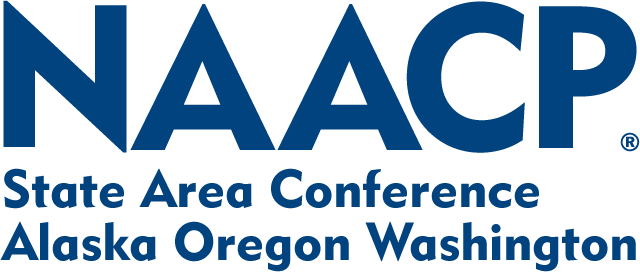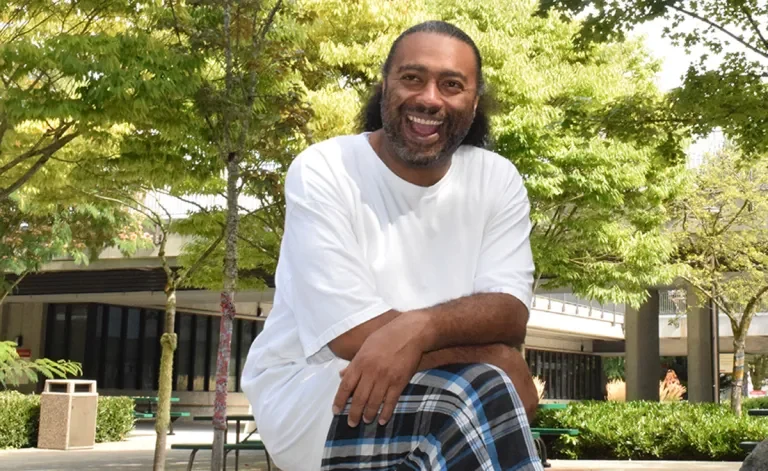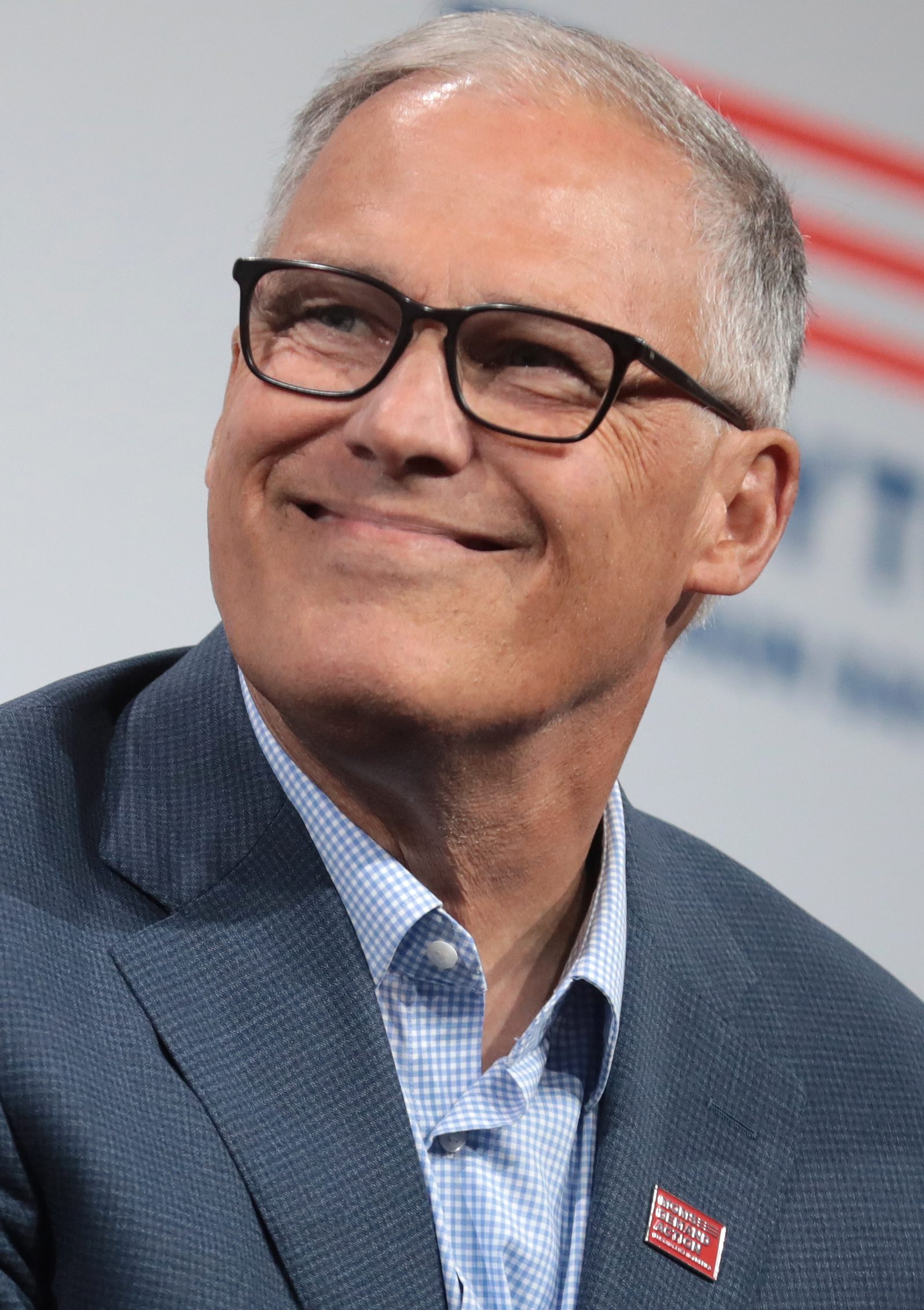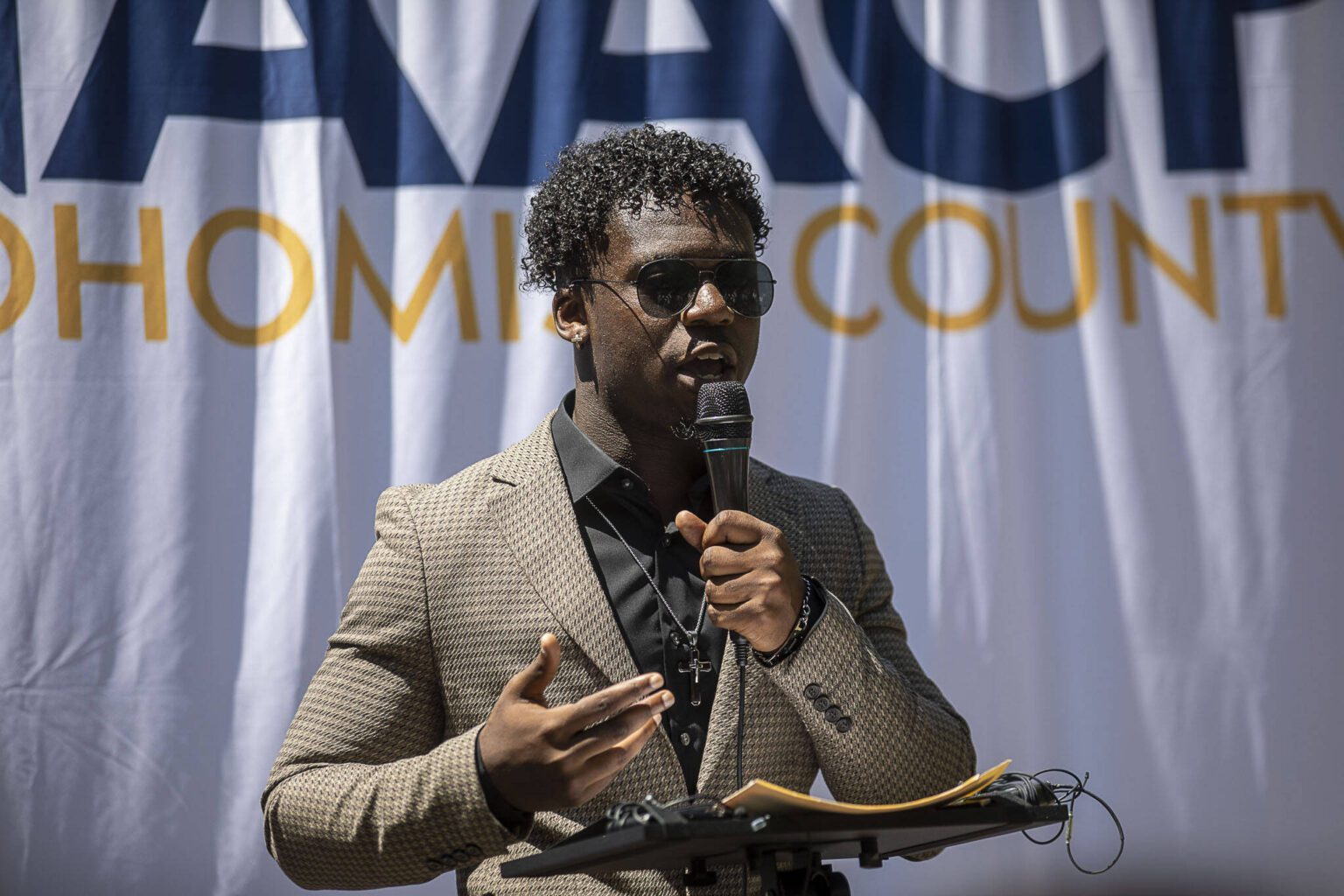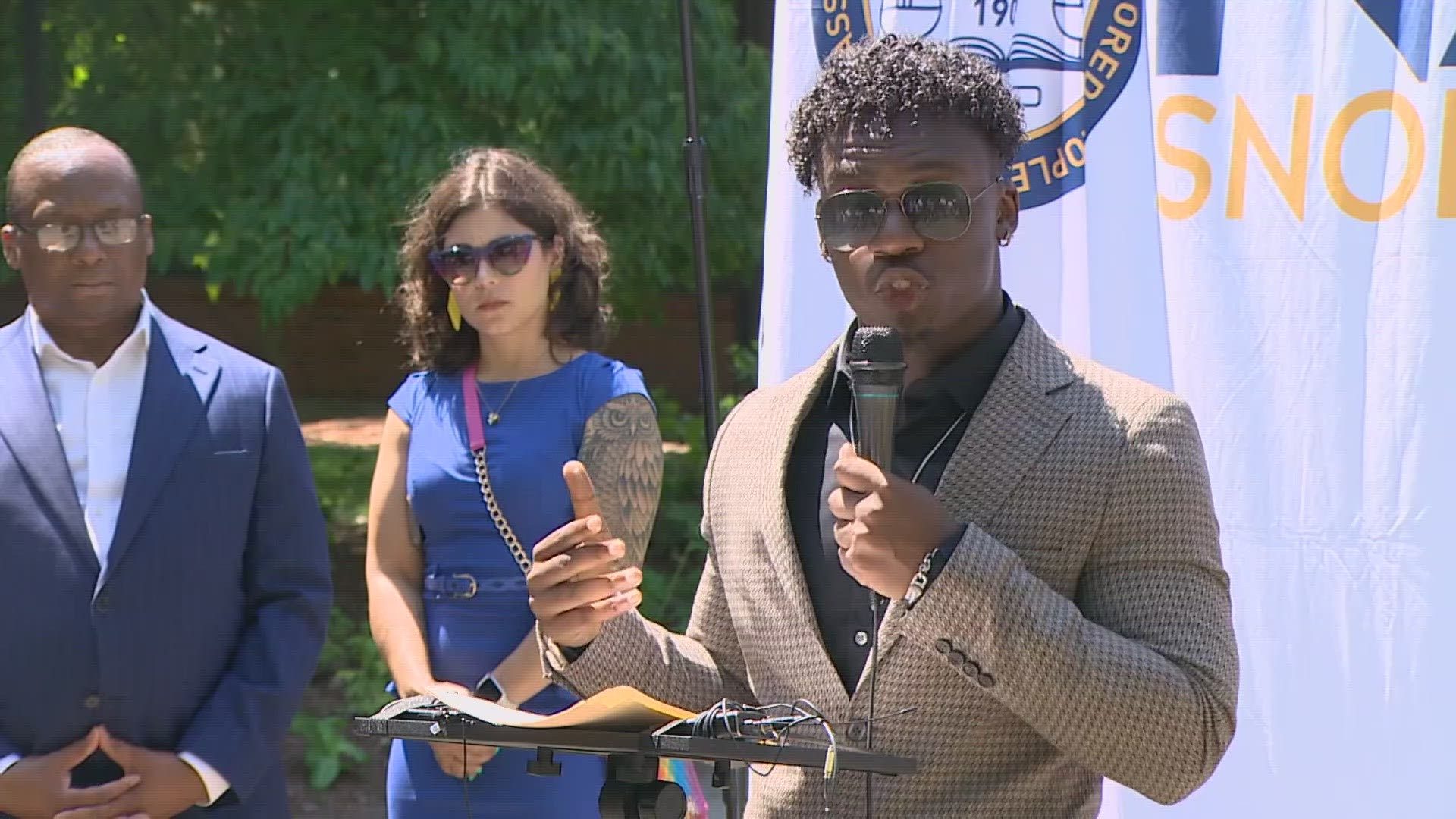Felix Dotson, one of four Black students at Cashmere High School in central Washington, graduates today. He says his peers would repeat a specific slur referring to his race at least 100 times a week. Sometimes it was directed at him and other times it would be dropped casually by other students as a swear word.
To keep track, he started a journal.
In an entry from April 27, Dotson, one of about 500 students at the school in rural Chelan County, wrote that four senior boys repeatedly unplugged the welding machine in the auto shop as he was attempting to attach a pair of rock sliders on his 1996 GMC Jimmy, which he bought and fixed up with money he earned working after school. Dotson wrote that a teacher witnessed the whole thing.
“I put everything I took and used back,” Dotson wrote in his journal. “The teacher still didn’t say shit after hearing the guys yell out ‘I HATE [racial slur]’ as well as unpluging [sic] my welder so I can’t finish my project. I did finish it.”
Dotson, who filed a complaint with the school district with the help of a friend’s parent, said he’s speaking out now because he’d like the Cashmere School District to take racism seriously and address it regularly throughout the school year.
Dotson said that as far as he could recall, the issue of racism was addressed just once at the beginning of the year in a video one of his teachers played for the class.
“But that video pretty much nobody listened to, and I’m sure they’ve forgotten about it already,” he said.
Cashmere is a small town of just over 3,200 in Chelan County along the Wenatchee River. (Dominick Bonny for Crosscut)
Even as schools and educators statewide and nationwide grapple with how to talk to students about race and racism in the United States, students and educators throughout Washington say that racism and racist bullying by peers remain a problem in schools. Additionally, national mental experts say that racially motivated bullying and abuse can significantly impact the mental health of young people of color.
Schools throughout the state continue to grapple with racist bullying. In May, more than 150 people turned out to protest what they perceive as a lack of follow-through after racist incidents against Latino students in North Kitsap School District allegedly occurred six months ago.
In May 2021, the South Central Athletic Conference sanctioned Connell High School after fans used racist language and offensive gestures at a girls’ basketball game against Zillah High School. The school also self-imposed a ban on student fans after that incident, according to the Yakima Herald-Republic. In early 2022 the Camas School District launched an investigation after a girls’ basketball game against Portland’s Benson High. Benson head coach Eric Knox alleged that his team, which according to The Columbian is predominantly Black, was subjected to taunts and racist slurs from the Camas student section.
Last year, the AAKOMA Project, a national nonprofit with the mission of meeting the mental health needs of youth of color, reported that Black youths were the most likely to say they had experienced racial trauma often or very often in their lives.
“From a very young age, I would say probably elementary school, they’re having to think about how the world views them and they’re having to carry that and it’s stressful,” said Dr. Alfiee Breland-Noble, the group’s founder and president. “It can be anxiety-inducing and it can just make young people feel isolated.”
Kevin and Karlye Risdon look through the Cashmere School District’s policies on harassment, intimidation and bullying. The Risdons helped Felix Dotson file a complaint with the district. (Dominick Bonny for Crosscut)
The isolation can especially be felt in Cashmere, a small town nestled in the Cascade foothills about two hours from Seattle by car. With a population of about 3,200, it’s a sleepy town known for producing famous fruit candy and standout athletes like Hailey Van Lith, the Cashmere High basketball star mentored by the late NBA great Kobe Bryant, who brought his daughter Gianna to Washington to watch the Bulldogs play just weeks before the Bryants died in a helicopter crash, according to the Los Angeles Times.
Less than 1% of students at the high school are Black. While more than half of Dotson’s peers are white, more than a third of the student population of Cashmere High School is Latino. Some of the boys who use the racial slur around him are Latino, Dotson said.
He said peers commonly use the slur in the presence of teachers and staff. Dotson described one such instance during a passing period in which his teacher heard a senior boy use the word.
“[A]s he’s walking past me he says ‘[racial slur],’” Dotson wrote. Dotson said he turned to look at his teacher for a response. “[H]e says, ‘I give you permission to beat him up.’”
Dotson also sees the word used by his peers away from campus, at all hours of the day and night, in the digital space. In a Snapchat group chat with about 30 senior boys, one of Dotson’s peers who was taunting him in the auto shop jokingly admonished the others for using that racial vulgarity, after a long thread of racist memes.
“Stop saying [racial slur] it’s racist!” one classmate wrote in the chat.
“Okay [racial slur],” another replied.
Felix took screenshots of that and other portions of the Snapchat thread, which alerted the other users in the group, drawing their ire and more negative attention.
Dotson reached his breaking point on May 4 and confronted one of his peers in a computer lab. The other young man had been playing a video game and used the slur multiple times in Dotson’s presence as an exclamation because “something in his game was not going right,” Dotson said.
Dotson said he tossed a computer mouse in the classmate’s direction because he wanted him to stop. According to Dotson the mouse didn’t hit him, but he said the classmate jumped up and rushed at him, calling him by that vulgar term while putting him in a headlock.
“He whispered in my ear: ‘Listen here, this is my word and I can say it whenever I want, OK?’” Dotson said.
Dotson didn’t fight back. While the other student and his mother did not respond to Crosscut’s requests for comment, another student confirmed Dotson’s version of events.
After school, Dotson went to his girlfriend’s house, where he told her and her parents, Kevin and Karlye Risdon, what happened.
Kevin Risdon took notes, and the next morning helped the young man file a complaint with the Cashmere School District. (Risdon’s letter refers to Dotson as the reporter of the alleged incidents.)
“The mental health of reporter has been adversely impacted and contributed to extreme Consequences,” Risdon wrote to the district. “Addressing the above outcomes should not be interpreted as making reporter whole or rectifying the district’s failure to take action when the district staff, and thereby the district, became aware of the racial harassment.”
District officials responded in the same way officials in Camas, Connell and North Kitsap did – by tasking a third party with investigating what happened.
The third-party investigator, Ryan Rectenwald of Clear Risk Solutions in Moses Lake, told Crosscut he cannot comment on an active investigation.
A page of the Cashmere School District handbook lists the school’s policies on harassment, intimidation and bullying. (Dominick Bonny for Crosscut)
Principal Craig MacKenzie told Crosscut this week that the school is awaiting a final report, but has been in touch with Dotson, his family and the Risdons.
MacKenzie said the school has given consequences to students involved; has had a “purposeful discussion” with faculty around respectful communication; and is considering bystander intervention training for faculty and student leaders. MacKenzie said the school administration will also meet with student leaders to discuss how to improve respectful communication.
Katy Payne, executive director of communications with the Office of Superintendent of Public Instruction, told Crosscut that OSPI’s Equity and Civil Rights Office can be a resource for students and their families with concerns that issues of discrimination or bullying aren’t taken seriously enough at the district level.
“Every student has the right to feel safe, feel supported, and feel that they belong at school. School districts have a legal and moral obligation to protect the civil rights of all students and to provide a high-quality public education to all students without discrimination. Further, districts are required to investigate all complaints of and put a stop to any instances of discrimination, harassment, intimidation, and bullying.”
Breland-Noble of AAKOMA said it’s important for young people in Dotson’s shoes to realize that they are being marginalized – they are not marginal people. Being marginalized is something done to someone, not something individuals choose for themselves. She also said asking young people of color to be quiet about the discrimination they experience is dismissive and worsens the emotional and mental health impact.
“Anyone asking our young people who are experiencing discrimination to be quiet about it, to push it to the side, to push through – that is damaging to our young people,” Breland-Noble said. “Because it sends the message that your pain is less important than the victimizer.”
She said any school district failing to provide a safe environment for all children is failing in their primary responsibility, because you can’t learn in a space unless everyone feels safe.
Dotson’s adoptive parents, Ben and Farrah Dotson, say they are satisfied with the district’s response to the alleged assault.
“We are heartbroken and thankful this situation is being taken seriously,” Ben Dotson wrote in a text message.
The Dotsons, who are white, advised their son not to speak out and to keep his head down, but Ben said that because Felix is an adult, he has the right to make the decision to go public.
Kurtis Robinson, Spokane branch president and political action chair for the Alaska, Oregon and Washington area conference of the NAACP, applauded Dotson’s decision to speak out, and said that this kind of racial abuse in Eastern Washington should come as no surprise.
“Anybody that’s paying any attention knows this is a problem. Knows this is an American issue and knows that this is an Eastern Washington systemic dynamic,” he said. “As far as the issues of white-supremacy culture operating not only in our general society but especially [in] our educational institutions … it is incumbent on such institutions to proactively engage in dealing with this instead of waiting for us to tell them once again: ‘Hey, it’s still a problem.’”
As the investigation continues, Dotson said, the harassment has only increased. Dotson said the classmate he confronted in the lab threatened to use allegedly explicit images of Dotson and his girlfriend to exact revenge for filing the complaint.
“Have a good life bro. You ain’t gonna have any friends after this including me. U could have had a real conversation w me abt it and I would have stopped but now u did this to a lot of people,” the classmate wrote. “Also the pic is gonna get you in hella trouble btw. Like jail time. Should have just talked to us about it.”
Dotson said there are no such explicit images, so blackmail won’t work to silence him.
Dotson graduates today, and won’t be directly affected by the outcome of the investigation of the alleged racial abuse by his peers at CHS. But he is concerned by what other students of color will face in the years to come. It’s a sentiment shared by the Risdons.
“I am just concerned. How is this going to be managed? How will Felix be protected? How will other kids be protected?” Karlye Risdon said.
Cashmere School District superintendent Glenn Johnson said the district educates students in a way that prevents racism, and holds students accountable if they are acting in racist and discriminatory ways.
“The Cashmere School District provides a variety of student learning experiences across our K-12 system to prevent racism and discrimination,” he wrote. “Along with educating our students, when expectations are not met, students are held accountable for their actions per district policy and building discipline procedures.”
But community members continue to worry if the message is getting through. This week on Wednesday, during the annual “Senior Parade,” in which graduates ride through town in the back of pickups, boats, ATVs and horseback, a photo showed that one of the students wore a Confederate flag as a cape.
That followed an incident when two CHS students recently tore down at least one poster put up by the Equity Club that featured a rainbow Pride symbol with the words “Kindness, peace, love, inclusion, hope, diversity.”
The poster was retrieved from the trash and rehung on the wall. Principal MacKenzie said the students responsible were disciplined according to school policy, and he spoke with them about school being a place where students feel safe and accepted.
MacKenzie said the school’s goal is to train students to call out disrespect and “charged language” and for students to “take the lead as models of respectful behavior.”
“The end goal is an ideal, but affecting change and building is an ongoing process that demands daily attention. I’m encouraged that recent events will elevate the importance of this goal,” he wrote.
After recent events, people are watching to make sure changes at the school happen.
“I will say this officially that the NAACP for Washington, Oregon and Alaska is absolutely paying attention to this and absolutely expects some very serious and systemic changes to happen in that institution,” said the NAACP’s Kurtis Robinson. “And we will absolutely hold them accountable.”
